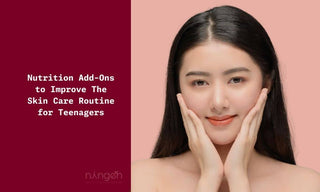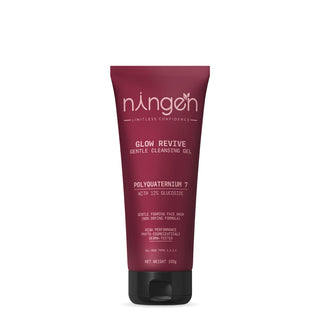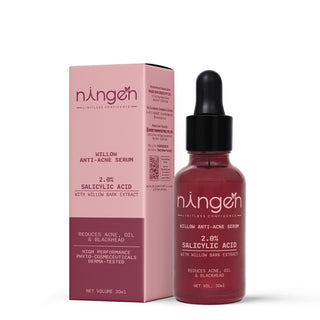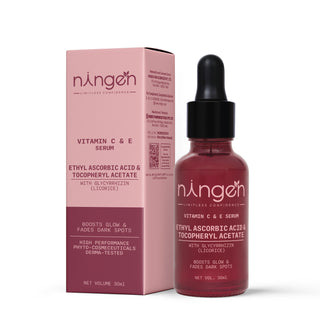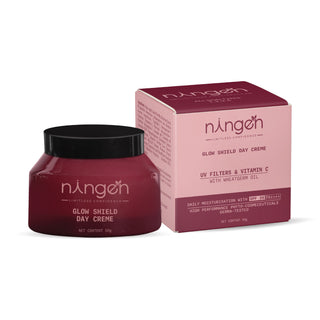TL;DR
Teen skincare isn’t just about cleansers and creams; nutrition plays a huge role in clear, glowing skin. Adding key nutrients like zinc (fights acne & oil), omega-3s (reduce inflammation), vitamin D & A (support cell renewal), and probiotics (balance gut-skin connection) can supercharge your results. New 2025 trends like adaptogens (for stress-related breakouts), personalized nutrition testing, and clean, sustainable supplements make it easier than ever to level up your glow. Affordable options include zinc-rich snacks, omega-3 seeds, sweet potatoes, and DIY probiotics. Stay consistent for 8–12 weeks, choose age-appropriate supplements, and always consult a doctor first.
This is exclusively for teens!
Are you tired of battling breakouts, struggling with dull skin, or just wishing your complexion had that extra oomph? We get it. Teenage skin can be a rollercoaster! While cleansers, toners, and moisturizers are your daily warriors, what if we told you the secret to truly amazing skin might just be chilling in your kitchen, or even your supplement cabinet?
That's right! We're diving deep into the world of "nutrition add-ons to improve the skin care routine for teenagers." Forget boring diets; we're talking about delicious foods and smart supplements that work from the inside out to give you that radiant, confident glow.
Let's unlock your inner glow-up!
In this Guide;
The Story Behind Why Traditional Skincare Isn't Enough
The Science-Backed Nutrition Add-Ons That Actually Work
Safety Guidelines Every Teenager Should Know
The Story Behind Why Traditional Skincare Isn't Enough
Let’s be honest. You’ve probably spent a ton of money on cleansers, toners, and spot treatments, only to find yourself still dealing with stubborn, persistent breakouts. Your story isn't unique; it’s the norm for most teenagers who are fighting an uphill battle without understanding the bigger picture.
Your teenage years are a hormonal rollercoaster, and your skin is getting hit from every direction imaginable. Think of your body as a complex ecosystem where everything is connected. When puberty’s hormones start to spike, your sebaceous glands work overtime, producing more oil than a fast-food restaurant. Dead skin cells begin piling up like autumn leaves, and breakout-causing bacteria have a field day. This is exactly where nutrition add-ons become your secret weapon.
The Science-Backed Nutrition Add-Ons That Actually Work
Now that we’ve established that your skin is just a messenger for what’s happening inside your body, let’s talk about the secret weapons you need to add to your routine. These aren’t just trendy ingredients; they are science-backed nutrients that go straight to the root of your skin issues.
The Zinc Story: Your Skin's Personal Bodyguard
If there were a Mount Rushmore for skin-clearing nutrients, zinc would definitely have its face carved there. But why is this mineral so special, and how does it actually work its magic on teenage skin?
Think of zinc as your skin’s personal bodyguard, working around the clock to protect and heal. It fights inflammation with the dedication of a medieval knight, helps wounds heal faster than you thought possible, and keeps those pesky bacteria in check. Zinc is essential for wound healing and reducing acne-causing bacteria, which is why it decreases inflammation and oil production over time. It's like the bouncer at your skin’s nightclub—it decides who gets in and who gets kicked out.
Most studies suggest a sweet spot between 30-40mg daily, but here’s the important part that many people miss: always check with a healthcare provider first. Taking too much zinc can backfire and actually cause irritation instead of improvement. Pro tip from someone who learned the hard way: take zinc supplements with a small snack if you have a sensitive stomach.
Omega-3 Fatty Acids: The Internal Firefighters
Remember when your mom told you fish was brain food? Well, plot twist—it turns out it's incredible skin food too! Omega-3 fatty acids have shown promising results in managing acne, and here's the bonus: they also support mental health. Let’s face it, dealing with breakouts can be incredibly stressful, so this dual benefit is like hitting the skincare jackpot.
These essential fatty acids work like internal firefighters, rushing to scenes of inflammation and putting out the fire before it spreads. They reduce inflammatory acne lesions, strengthen your skin's barrier function, balance oil production naturally, and support overall skin healing. It's like having a skilled emergency response team working inside your body 24/7.

Fatty acid-rich foods
The best sources include fish oil supplements, algae-based omega-3s that are perfect for vegans, or fatty fish like salmon and sardines consumed 2-3 times per week. Think of it as delicious medicine that your taste buds and your skin will both appreciate.
Vitamin D: The Sunshine Vitamin Revolution
Here's a plot twist that might surprise you: that vitamin D your body makes from sunshine doesn't just keep your bones happy and strong. Vitamin D stimulates cellular renewal and may reduce acne severity. It's essentially like giving your skin a natural refresh button, encouraging old, damaged cells to make way for fresh, healthy cells.
The teenage dilemma with vitamin D is real and widespread. Most teens are vitamin D deficient due to indoor lifestyles, necessary sunscreen use, and long school hours. It's ironic—the generation that needs it most is getting it least. Smart supplementation typically involves 1000-2000 IU daily, which is generally safe for teenagers, but here’s the key: get your levels tested first to understand where you currently stand. Knowledge is power, especially when it comes to your health.
Vitamin A: The Cellular Turnover Champion
Vitamin A isn't just about carrots and improved night vision—it's a legitimate skin-clearing powerhouse that deserves serious respect. This vitamin promotes healthy cell turnover, prevents pores from getting clogged with debris, reduces inflammation throughout your body, and supports your skin's natural repair processes.
However, vitamin A requires a "safety first" approach because it can be tricky to navigate. Too much can actually be harmful, especially for teenagers whose bodies are still developing. The smart approach involves sticking to food sources like sweet potatoes, carrots, spinach, and other colorful vegetables, or choosing teen-specific supplements with carefully measured, safe dosages.
Probiotics: The Gut-Skin Connection Revolution
Here's something that might completely blow your mind: your gut health directly impacts your skin in ways scientists are just beginning to fully understand. The gut-skin axis is absolutely real, and probiotics are gaining recognition as a helpful root cause approach to hormonal acne. This connection means that what's happening in your digestive system is literally showing up on your face.
Poor gut health can increase inflammation throughout your entire body, including your skin. It's like having a fire burning in your basement that eventually spreads smoke throughout the whole house. A healthy gut microbiome helps process hormones more effectively and reduces systemic inflammation, creating an environment where clear skin can thrive.

When shopping for probiotics, look for multi-strain formulas with at least 10 billion CFUs, including beneficial strains like Lactobacillus and Bifidobacterium. These friendly bacteria work like a skilled maintenance crew, keeping everything running smoothly inside your digestive system.
The Latest 2025 Trends: Level-Up Your Skin Nutrition
The world of teen skincare is evolving faster than ever, and 2025 brings some exciting new developments that are completely changing the game. This isn't just about what's new; it's about what's smarter and more aligned with the way you live.
The Rise of Adaptogens: Your Secret Weapon Against Stress Breakouts
Ever feel like a stressful week of exams or social drama shows up on your face as a new breakout? It's not a coincidence—it's a real thing. This year, adaptogenic supplements are becoming a major trend for a simple reason: they help your body cope with stress. Natural herbs like ashwagandha and holy basil help regulate your body's stress response, which can dramatically impact your skin's health and appearance. It's the ultimate inside-out fix for those stress-related breakouts.
Personalized Nutrition: The End of One-Size-Fits-All Skincare
We know your body is unique, so why would your skin nutrition be the same as everyone else's? A huge trend for 2025 is personalized nutrition testing. Instead of guessing what you need, you can get a comprehensive nutrient test to find out exactly what your unique body is lacking. Think of it as a personalized roadmap to better skin health—no more trying every supplement under the sun. It’s all about working smarter, not harder.
Clean & Sustainable: Good for You, Good for the Planet
Today’s teens are passionate about the planet, and that eco-conscious mindset is now extending to what you put in your body. Sustainable and clean supplements are taking over. You'll see more brands offering products with vegan, natural, and non-GMO ingredients. These brands are not only making supplements that are effective for your skin but also ensuring their ingredients are ethically and sustainably sourced. It’s the ultimate win-win: proving that caring for your skin and caring for the planet can go perfectly hand-in-hand.
Budget-Friendly Strategies for Nutrition-Powered Skincare
Let's be real for a second: being a teenager usually means your budget is pretty tight. And when you look at the price tag on a bottle of high-quality supplements, it can feel like a total no-go. But here's the good news: you can absolutely power up your skincare from the inside out without emptying your wallet. The secret is knowing where to look.
DIY Nutrient Boosters: Your Wallet's New Best Friend
Think of your kitchen as a secret weapon. You can get incredible skin-supporting nutrients from simple foods that cost way less than supplements. Your wallet will thank you for these DIY boosters:
-
Zinc-rich snacks: Grab a handful of pumpkin seeds, chickpeas, or cashews. They're a fraction of the cost of a supplement and deliver the exact same benefits.
-
Omega-3 powerhouses: Toss some walnuts, chia seeds, or flaxseeds into your morning oatmeal or a smoothie. It's an easy way to get your daily dose of internal firefighters.
-
The Vitamin A MVP: Bake up some sweet potato fries for a delicious and affordable vitamin A boost.
-
Budget Probiotics: Homemade kefir or fermented vegetables (like sauerkraut) can give you the gut-balancing benefits of probiotics at a fraction of the cost.
Smart Shopping: Get the Glow Without Going Broke
If you do decide to go the supplement route, learning how to shop smart can save you a ton of cash. Think of it as being a savvy shopper for your skin:
-
Go Generic: Look for generic or store brands. The active ingredients are often identical to the pricier name brands.
-
Combo-Up: Look for combination supplements that include multiple nutrients, like a formula with both zinc and vitamin C.
-
Hunt for Sales: Keep an eye out for sales and special deals, or consider buying in bulk when possible.
-
Check Your Insurance: It might sound wild, but some health insurance plans cover nutritional counseling, which could help you get a personalized plan for free.
Safety Guidelines Every Teenager Should Know
Understanding what to avoid is just as important as knowing what to embrace. Red flags include products promising "instant results," supplements without third-party testing, mega-dose formulas, and products marketed exclusively online without clear ingredient lists. These warning signs often indicate products that prioritize marketing over safety and effectiveness.
Green lights to look for include third-party testing for purity, age-appropriate dosages, clear and comprehensive ingredient lists, and recommendations from qualified healthcare providers. These indicators suggest products that prioritize your safety and well-being above quick profits.
Final Insights
Your teenage years don't have to be defined by constant skin struggles. By understanding how nutrition can powerfully support your skincare routine, you're taking a proactive, science-backed approach to achieving healthier skin that lasts.
Remember, the best routine is one that works specifically for you—your unique skin, your lifestyle, and your budget. The path to better skin isn't always linear, but it's incredibly rewarding for those who stick with it. You’re building a foundation for lifelong skin health.
So, here's my question for you: What's your biggest skin concern right now, and which nutrition add-on are you most excited to try? Drop a comment below and let's start a conversation.
Frequently Asked Questions
Q1.How long does it take for nutrition add-ons to improve teenage acne?
A. Most teenagers see initial improvements in 6-8 weeks, with significant results appearing after 12-16 weeks of consistent supplementation. The skin's natural renewal cycle takes about 28 days, so patience becomes absolutely essential for achieving lasting, meaningful results.
Q2. Can teenagers take adult vitamin supplements, or do they need special formulations?
A. Teenagers should prioritize age-appropriate formulations whenever possible, as their nutritional needs differ significantly from adults. Teen-specific supplements typically contain safer dosages and nutrients specifically tailored for growing bodies and the unique hormonal changes of adolescence.
Q3. What's the best time of day to take skin-supporting supplements?
A. Zinc performs best when taken on an empty stomach, though you can take it with food if it causes nausea. Omega-3s should be consumed with meals for optimal absorption. Fat-soluble vitamins like A, D, and E are most effective when consumed alongside healthy fats.
Q4. Are there any supplements teenagers should avoid for skin health?
A. Teenagers should avoid high-dose vitamin A supplements, be cautious with iodine supplements which can worsen acne, and avoid biotin mega-doses. Always consult healthcare providers before starting any new supplements to ensure safety and appropriateness.
Q5. How much zinc should a teenager take daily for acne improvement?
A. Studies suggest 30-40mg of elemental zinc daily for acne management, but teens should start with 15-20mg and increase gradually under medical supervision to avoid stomach upset and potential copper deficiency.
Q6. Can nutrition add-ons replace topical acne treatments for teenagers?
A. Nutrition add-ons work most effectively as complements to, not replacements for, topical treatments. The most successful approach combines proper skincare, good nutrition, appropriate supplements, and medical treatment when necessary.
Q7. What foods should teenagers avoid to prevent supplement interactions?
A. Dairy products can interfere with zinc absorption, calcium-rich foods may block iron absorption, and high-fiber foods can reduce the effectiveness of certain vitamins when taken simultaneously with supplements.
Q8. Is it safe for teenagers to take probiotics for skin health?
A. Generally, yes, probiotics are safe for most teenagers and can benefit both digestive and skin health. Look for multi-strain formulas with 10-50 billion CFUs, and start with lower doses to assess individual tolerance.
Q9. How can teenagers afford quality supplements on a limited budget?
A. Focus on whole food sources first, buy generic brands with identical active ingredients, look for combination supplements, shop sales and bulk options, consider splitting costs with parents, and prioritize the most research-backed nutrients like zinc and omega-3s.
Q10. When should a teenager see a dermatologist instead of relying on supplements alone?
A. Consult a dermatologist if acne is severe, cystic, causing scarring, significantly impacting mental health, or not improving after 3-4 months of consistent supplement use combined with a proper skincare routine.
Sources:
-
MDacne - Best Skin Vitamins 2025
-
Healthline - The Best Minerals and Vitamins for Acne
-
National Center for Biotechnology Information - Acne and Omega-3 Fatty Acids
-
Dr. Jolene Brighten - Best Vitamins & Supplements for Hormonal Acne
-
Alex Fisher Health - Teenage Acne Management
Disclaimer: This article is for informational purposes only and should not replace professional medical advice. Always consult with healthcare providers before starting new supplements, especially for teenagers.


